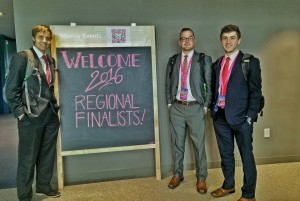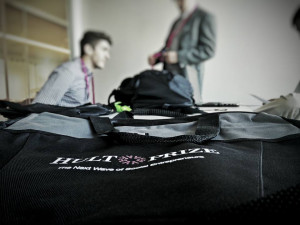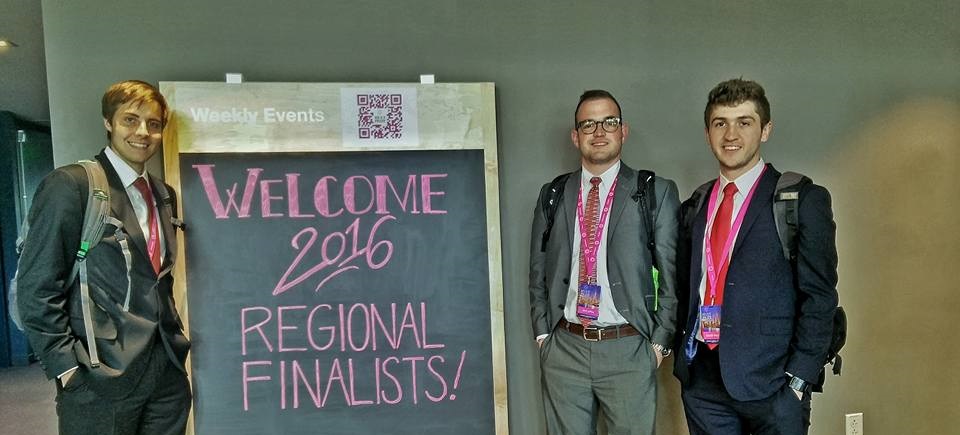Maryville College Hult Prize winners go to Boston

for their chance to win one million dollars to develop their product. Photo by Souha Arbi.
The Hult Prize is the largest student competition for social good in the world. It focuses on crowd-sourcing ideas for social change, and the winner gets $1 million to start their social enterprise. The competition began in 2009 and was founded by the Hult International Business School.
The winning team of the Hult Prize at Maryville College went to Boston after the Tunisian exchange student, Souha Arbi, brought the competition to MC for the first time. The winning team from MC consisted of team members Eric Lipka, Caleb Willis, Will Marttala and Chase Condrone.
Around 60 teams comprised of college students were competing against each other in Boston at one of the five regional competitions. The competition lasted the entire weekend from March 11-13. The other four regional competitions took place in San Francisco, London, Dubai and Shanghai during the same weekend. The winners from each regional competition go on to compete in the final competition.
This year’s topic was “crowded urban spaces”. The goal of each team’s concept was to increase the income of people in crowded slums of India in order to improve life quality and economy there.
The concept of the MC team involved recycling. They proposed an initiative that encouraged people to recycle trash by offering a monetary incentive. This would help reduce waste. In addition, they proposed using the recycled materials into products for sale such as clothing or bedding. The creation of these goods could help people to start local businesses, and the money could be invested in community and economy.
On Friday March 11 at 6 a.m., right before spring break started, Lipka, Willis and Marttala departed from McGhee Tyson airport in Knoxville. Condrone could not attend the conference, but Arbi, MC’s Hult Prize director, was able to travel with the team. She did not only bring the Hult Prize to MC but she also organized the competition on campus.
“During the competition in Boston, I felt like the manager of our team,” Arbi said.
Only five hours after their departure, the four students were already lining up at the registration for the competition at the Hult Prize Business School. In the afternoon, they had a welcome seminar for all competitors with guest speakers and previous winners. In the evening, the three boys used the time to go over their presentation again to make sure their PowerPoint presentation was ready for submission at 8 a.m. the next day.
On Saturday, the teams were divided into morning and afternoon sessions. One team at a time gave its business pitch presentation. The teams who were not giving presentations at that time were divided into peer panels for feedback and to ask the presenting teams questions.
The MC team presented at 1:37 p.m.
“The closer we came to our presentation, the more I was freaking out,” said team member Willis. “We were sitting there on edge, waiting and I was walking in circles.” The presentation time came and everything went well.
“Ten teams always watch one presentation,” Willis said. “Including judges, there were around 40 people [watching], then they asked you questions afterwards. It was a little scary because they can ask you anything.”
Though Willis’ team did not win, they were proud of their idea and the effort they put into it. In the end, they realized that their level of preparedness did not match that of their competition, Willis explained.
“Our idea was not quite as fleshed out as others,” Willis said. “There were teams that already actually travelled to India or have been to slums. To improve our concept and adjust it more to reality, we would need actual travelling, more data and numbers for actual projections of the situation there, but I think our idea was good.”
Despite not winning the competition, there was some time for the team to wind down after all of the presentations were done. On Saturday evening, the Hult Prize Foundation hosted an after-party for all of the participants in the competition, and the MC team attended. Before flying out on Sunday, they had some time to explore the city and visit the Boston Harbor.
Overall, Willis said that visiting the competition was a worthwhile experience that allowed the group to see some great examples of students who are truly dedicated to contributing to social change.
“The experience was very cool,” Willis said. “We saw all these really great ideas to help people and everyone was very passionate about what they were doing. And we also all felt good about our presentation; we definitely did our best.”
Arbi is also proud. As a student who attends a business school in Tunis, she wanted to bring the Hult Prize competition to MC because she wanted students from different majors and with different perspectives working together on social problems.
“It was cool to see MC on the same level with Harvard and MIT,” Willis said.
He thinks that, with a longer tradition of the Hult Prize at MC, they could improve the organization and the level of professionalism. Arbi wrote down information about her experiences for the next possible Hult Prize campus director. She also included suggestions for improving future competitions on campus in order to increase the chances of winning at regionals.


